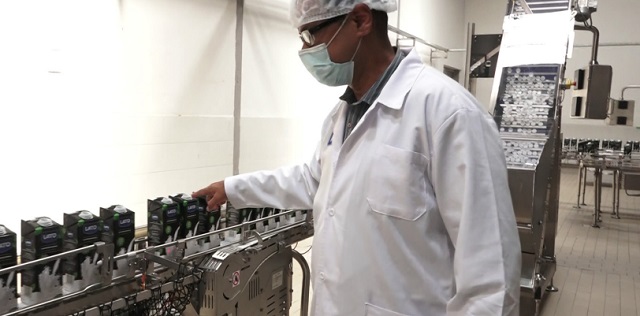
Unveils Shs9.25bn packaging line to boost production, market access
Kampala, Uganda | JULIUS BUSINGE | Pearl Dairy Farms Limited, the processor and manufacturer of Lato Milk branded products has unveiled a new Shs9.25billion Tetrapak Edge production line to its Mbarara based factory.
Company executives said on June 29 that the new line will boost Uganda’s dairy sector and support the company’s strategy of accessing markets beyond East Africa.
This development comes at a time the company is continuing to struggle to access some big EAC markets like Kenya because of protectionism and political reasons.
Bijoy Varghese, the company’s general manager said, the new line from the Sweden based TetraPak Company, ensures that milk is packaged in a sterile environment and maintains the freshness of the product while ensuring no bacteria or other micro-organisms contaminate it during its self-life of 12 months.
“The new Tetrapak packaging delivers the best in-class resealable closure technology in the industry currently which will allow consumers to safely store the pack at home without the worry of spoilage with maximum convenience of use,” Varghese said.
He said, the new line will also allow them to buy more milk from farmers as it has capacity to produce over 130,000 litres per day.
With a capacity of over 800,000 litres of milk a day, Pearl Dairy produces a wide basket of dairy products including Yogurt, Instant full cream powder milk, Whole milk powder, Skimmed milk powder, UHT milk, Butter, Ghee and Butter Oil under the familiar name of Lato Milk.
Varghese cautioned consumers, saying one of the biggest myths in the market is that long life milk has preservatives or additives.
“This is completely untrue,” he said, “the long life for the product is as a result of carefully treating the milk during the production processes using state-of-the-art machinery and packaging it in a highly sterile environment with high quality packaging materials.”
Market access
The new development means that the company now has to demonstrate that it will benefit farmers that largely depend on processors to sell their raw milk at good prices.
At the beginning of 2020, the company laid off approx.1,500 employees when it stopped exporting milk and milk products to Kenya, its largest market in East Africa.
Kenyan authorities, at that time, were confiscating imported Ugandan milk and blocking entry of trucks into the country on grounds that the milk was being smuggled into the country and hence killing local players. But Pearl Dairy executives dismissed these reports as untrue.
The entry of Pearl Diary into the sector had seen milk imported from within East African Community member states hit 110.7 million litres by September 2019, from just three million litres in 2016.
Authorities from Uganda and Kenya have repeatedly said they are in talks to solve this impasse but nothing has come to pass yet. As a result, prices have since been fluctuating and farmers continue to count losses.
In May 2021, in separate interviews, dairy farmers linked to Pearl Dairy said the price of milk had dropped to Shs600, down from an average of Shs800 in March and April and slightly over 1, 500 in some periods before the Kenyan ban in 2020.
“You cannot plan when prices keep changing,” George Buracweke from Kiruhura district told The Independent.
Glorias Ankunda, an agriculture extension worker hired by Pearl Dairy Farms Limited said the latter has cut purchase of milk from farmers by around 55% since the Kenyan ban was instituted to 250,000 liters from 800,000 liters.
Ankunda said, farmers’ livelihoods have negatively been impacted by the drop in milk prices, and urges government to further engage Kenyan authorities to lift the ban.
“We have trained farmers on best farming practices and are able to now produce a lot of milk but the market is small,” Ankunda said. The same call has been severally made by Uganda Manufacturers Association, an umbrella body for all manufactures in Uganda.
Uganda produces 2.6 billion litres of milk per annum. However, domestic demand stands at only 800 million litres, creating a huge surplus that foreign markets especially Kenya would consume.
Going forward, Bijoy said, the new packaging technology gives a smart, innovative and a fresh new look from the familiar and well-loved packaging that Lato Milk provides.
****
 The Independent Uganda: You get the Truth we Pay the Price
The Independent Uganda: You get the Truth we Pay the Price



